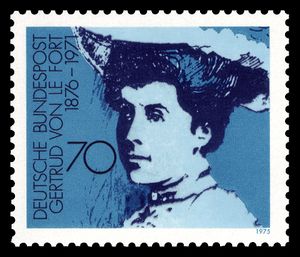گرترود فون لى فورت
البارونة گرترود فون لي فورت " Gertrud von Le Fort " اسمها الكامل: "Gertrud Auguste Lina Elsbeth Mathilde Petrea Freiin von Le Fort" ؛ وُلدت في 11 أكتوبر 1876 في ميندن وتوٌفيت في 1 نوفمبر 1971 في اوبرستدورف) كانت كاتبة روائية المانية، وكاتبة شعر و مقالات. لها خلفية بروتستانتية، لكنها تحولت إلى الكاثوليكية في عام 1926. اكثر كتاباتها أتت بعد تحولها إلى الكاثوليكية . في عام 1952 حصلت على جائزة گوتفريد كلر للآداب.
حياتها
وُلِدت لى فورت في مدينة ميندن، في مقاطعة وستفاليا السابقة، فيما كان مملكة پروسيا ضمن الامبراطورية الألمانية. وكانت ابنة لكرنل في الجيش الپروسي، من أصل هوگنو سويسري. تعلمت في هيلدزهايم، ثم التحقت بجامعات هايدلبرگ، ماربورگ وبرلين. ثم استقرت في باڤاريا في 1918، لتعيش في بايربرون حتى 1939.[1]
Despite publishing some minor works previously, Le Fort's writing career really began with the publication in 1925 of the posthumous work Glaubenslehre by her mentor, Ernst Troeltsch, a major scholar in the field of the philosophy of religion, which she had edited. She converted to Roman Catholicism the following year. Most of her writings came after this conversion, and they were marked by the issue of the struggle between faith and conscience.[2]
In 1931 Le Fort published the novella, de:Die Letzte am Schafott (The Last One at the Scaffold); an English translation, entitled Song at the Scaffold, appeared in 1933.[3] This work was the inspiration for the opera Dialogues of the Carmelites written by Francis Poulenc, which premiered in 1957. The opera was based on a similarly entitled libretto by Georges Bernanos.
Le Fort went on to publish over 20 books, comprising poems, novels and short stories. Her work gained her the accolade of being "the greatest contemporary transcendent poet". Her works are appreciated for their depth and beauty of their ideas, and for her sophisticated refinement of style. She was nominated by هرمان هسه لـجائزة نوبل للأدب, and was granted an honorary Doctorate of Theology for her contributions to the issue of faith in her works.[4]
In 1952, Le Fort won the Gottfried-Keller Prize, an esteemed Swiss literary award.
Among her many other works, Le Fort also published a book titled Die ewige Frau (The Eternal Woman) in 1934, which appeared in paperback in English in 2010. In this work, she countered the modernist analysis on the feminine, not with polemical argument, but with a meditation on womanhood.[5]
In 1939 Le Fort had made her home in the town of Oberstdorf in the Bavarian Alps, and it was there that she died on 1 November 1971, aged 95.[6]
مأثورات
- Denn die Welt kann zwar durch die Macht des Mannes bewegt werden, gesegnet aber im eigentlichen Sinne des Wortes wird sie immer nur im Zeichen der Frau.
- Heute hat die Frauenbewegung ihre Ziele weithin erreicht - wir stehen nicht mehr ihrem Kampf, sondern dessen Resultaten gegenüber.[7]
كتابات عنها
- Helena M. Tomko : Sacramental Realism: Gertrud von le Fort and German Catholic Literature in the Weimar Republic and Third Reich (1924-46)[8]
الهامش
- ^ The Oxford Companion to German Literature "Gertrud von Le Fort", as found in Answers.com
- ^ Oxford Companion
- ^ "The Song at the Scaffold". catholicfamilyvignettes.com. July 17, 2009. - The original publisher in English was Sheed & Ward of London
- ^ German 115 Fall 2005 USDA Graduate School "Gertrud von Le Fort"
- ^ Le Fort, Gertrud (2010). Alice von Hildebrand (translator) (ed.). The Eternal Woman:The Timeless Meaning of the Feminine. San Francisco: Ignatius Press. ISBN 978-1-58617-298-5. Retrieved 2012-08-06.
{{cite book}}:|editor=has generic name (help) - ^ Oxford Companion
- ^ Die ewige Frau: die Frau in der Zeit; die zeitlose Frau, Kösel Verlag 1960, S. 90
- ^ "Sacramental Realism: Gertrud Von Le Fort and German Catholic Literature in ... - Helena Mary Tomko - Google Boeken". Books.google.com. Retrieved 2012-06-07.
وصلات خارجية
- CS1 errors: generic name
- Pages using authority control with unknown parameters
- مواليد 1876
- وفيات 1971
- أشخاص من ميندن
- أشخاص من مقاطعة وستفاليا
- ألمان من أصل هوگنو
- متحولون إلى الكاثوليكية من الكالڤنية
- بارونات ألمانيات
- كتاب كاثوليك رومان
- German people of Swiss descent
- Writers from North Rhine-Westphalia
- كاتبات ألمانيات
- Knight Commanders of the Order of Merit of the Federal Republic of Germany
- Westphalian nobility
- كتاب ألمان
